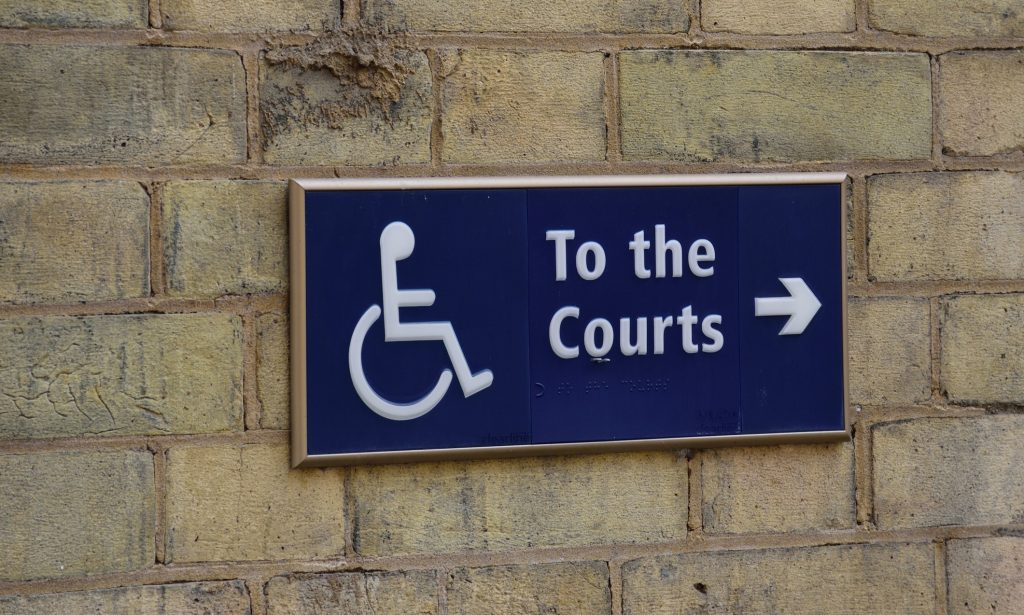In a divorce proceeding, the court determines who should have custody (and decision-making authority) over any minor children. When a child subject to such an order reaches majority, the court order usually expires. But when the now-adult child has a disability, either or both parents may seek appointment as guardian. Does the divorce court custody order control what happens in guardianship court?
We’re only talking about Arizona law
We frequently remind readers that we are Tucson elder law attorneys, and we know a few things about Arizona law. Don’t trust us in interpretation of the law in other states. You should also be suspicious of our views on matters not related to estate planning, elder law, probate or trust administration. Today we’re going to venture a little out of our usual lane, and write about divorce law and child custody.
If a now-adult person with a disability needs a guardian, does the divorce court custody order just get transferred into a guardianship order? That would make a certain amount of sense — especially since the parents may have already litigated the questions now re-raised in the adult guardianship matter. Is one parent better than the other at parenting? Does the child (now adult) have a preference? Does either parent have a history of either positive or negative behavior? Those are questions that both the divorce and guardianship judges focus on.
Arizona has a statute that directs the guardianship court to consider the divorce court custody order. That statute was reviewed in a recent (but “unreported”) Arizona Court of Appeals decision.
A couple gets divorced, and their child grows up
Consider the marriage, and then divorce, of Frank and Anne (not their real names, incidentally). When they split up in 2003, they were awarded joint custody of their five-year-old son. Arnold was, and remains, completely dependent on others for his care. He has, among other things, cerebral palsy, epilepsy, blindness and autism.
When Arnold was about to turn eighteen, Anne applied to be appointed as his guardian. Though a parent has priority for appointment as guardian, it is not automatic. The probate court must make a determination that a guardian is needed, and select the person (or persons) who would be the best appointee.
But when there is an existing divorce decree, the probate judge is supposed to follow the divorce order — at least, in most cases. Arizona Revised Statutes section 14-5311(D)(2) even addresses Arnold’s case. If there was a joint custody order in place when the child turned eighteen, the probate court “shall appoint both persons as the incapacitated persons co-guardians.”
In the first go-round, Frank agreed that Anne could be sole guardian. In return, he received her assurances that he would have regular visitation with their son. But a year later, he decided he wanted to be appointed as co-guardian for Arnold. He filed a petition and scheduled a court hearing.
The probate judge decided that Frank and Anne had too much trouble agreeing on anything about Arnold’s care. If both were appointed as co-guardians, reasoned the judge, nothing would get accomplished, and the court would be in the business of settling all disputes. The judge declined to appoint Frank as co-guardian, finding that it would not be in Arnold’s best interests.
Frank appeals
Citing the statute mandating appointment of co-guardians when there was a divorce court custody order, Frank filed an appeal. The Arizona Court of Appeals considered the question, and then ruled against Frank — and upheld the probate court’s order.
How could that be? Was it because Frank had agreed that his ex-wife could be sole guardian for the first year after Arnold’s majority? No. It was because of the introductory sentence in the Arizona statute.
Anne pointed to the language of the statute. It orders the probate judge to follow the earlier divorce court custody order “unless the court finds the appointment to be contrary to the incapacitated person’s best interest.” That was exactly what the probate judge had found, and his order was affirmed. In re Co-Guardianship and Co-Conservatorship of Hadi, April 18, 2019.
Some loose ends in the Hadi case
Let’s follow up with a couple additional notes of interest:
- The case is an “unreported” case, though it appears in the online reports and is easily available. That just means that the appellate judges decided it wasn’t significant enough to allow lawyers to cite it in later, similar cases. We readers all get to decide how significant we think a case is, but generally our weekly newsletter avoids unreported cases because of the lack of precedential value. We think this one is more interesting than the judges themselves gave it credit for.
- There’s actually another, also interesting, issue in the Hadi case. Frank initially applied to be appointed as both guardian and conservator. The former role (in Arizona) would mean he would have had equal authority over health care, living arrangement and social programs for Arnold. The latter would have meant he had equal authority over Arnold’s finances. The probate judge decided that Arnold didn’t have any assets that needed management, though — his only income was from his disability, and the Social Security Administration has a “representative payee” program to keep management of their funds out of the courts. The Court of Appeals agreed with the probate judge that there was no need to appoint a conservator.
- Anne asked that the Court of Appeals not only reject Frank’s arguments, but make him pay her attorneys’ fees, as well. The Court of Appeals decided to make each side pay their own fees, though Frank was ordered to pay Anne’s court costs (like filing and copying fees).



